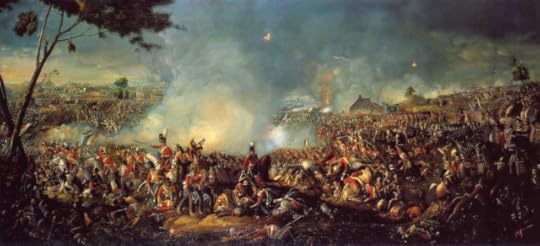Napoleon defeated at the Battle of Waterloo
18 June 1815
Napoleon defeated at the Battle of Waterloo
In a day-long battle near Brussels, Belgium, a coalition of British, Dutch, Belgian, and German forces defeated the French army led by Emperor Napoleon Bonaparte. Napoleon’s defeat at Waterloo led to his second and final fall from power, and ended more than two decades of wars across Europe that had begun with the French Revolution.
Napoleon had been defeated in 1814 and forced to give up his imperial throne. Exiled on the island of Elba, he plotted a return to power that he launched in March 1815 with his escape and return to France.
Reaching Paris and seizing power once more, Napoleon organized a new government and then quickly gathered an army about him. He marched northeast to meet a hastily-assembled coalition against him. With around 100,000 soldiers each, the two forces were nearly equal in size.

Battle of Waterloo 1815 by William Sadler, ~1839. Source: Wikimedia Commons.
Napoleon had the advantage of facing armies that were separated from one another, and his forces won initial victories on June 16 against the Duke of Wellington’s British forces and Gebhard von Blücher’s Germans. However, the Prussian rear guard held French forces under Emmanuel de Grouchy in check far from the main battlefield while the rest of the German army conducted a forced march to join Wellington and the other allies there.
That failure — coupled with Napoleon’s decision to delay his attack until midday, to allow the ground to dry after a rain — doomed the French army. During a long afternoon of fighting, Blücher’s troops forced Napoleon to commit more of his army to one side of the battlefield, preventing him from exploiting advances against Wellington’s forces. When the final French attack was mounted, at eight in the evening, it was repulsed by stiff defense. Then the allies counterattacked and the French forces were overwhelmed, leaving the field in a panic.
Napoleon lost 25,000 men (killed and wounded) and had another 9,000 captured. Allied casualties numbered about 23,000. Within days, Napoleon was forced to abdicate once again. This time, he was exiled to far-off St. Helena, where he died nearly six years later.
“This Day in World History” is brought to you by USA Higher Education.
You can subscribe to these posts via RSS or receive them by email.



Oxford University Press's Blog
- Oxford University Press's profile
- 238 followers




